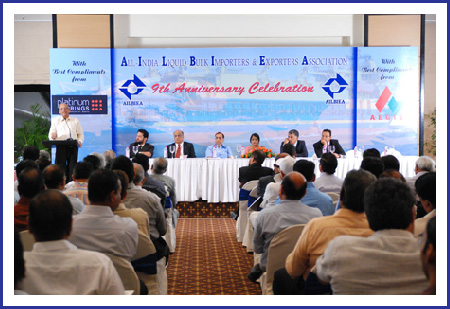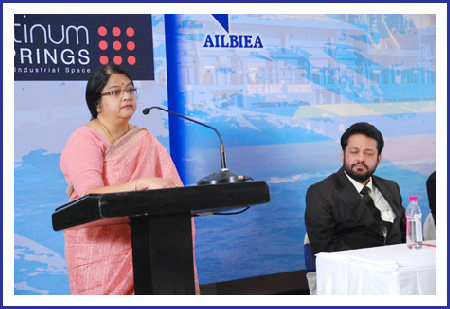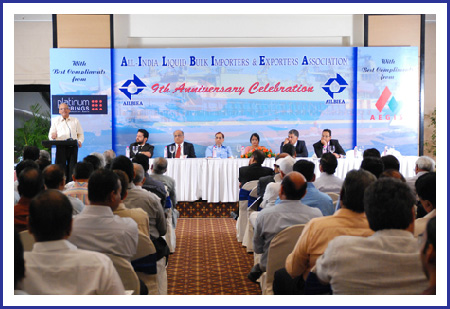








9th Anniversary
We contend that for a nation to try to tax itself into prosperity is like a man standing in a bucket and trying to lift himself up by the handle." With complexities and multiplicity of ever-increasing tax levies (including customs and excise duties) becoming the order of the day, the business environment continues to get vitiated and murkier than ever before. Host of new taxes (which include duties, levies cess etc.) keep surfacing every year with unflinching and unabashed conviction, increasing the (already over-loaded) burden on Trade and consequently on the common man.
The government system strongly believes that what goes up must stay there and should never be brought down or removed. The art of taxation consists in so plucking the goose as to obtain the largest possible amount of feathers with the smallest possible amount of hissing. What are we, the honorable citizens and law-abiding tax-payers doing? We are meekly surrendering to the unjust form of multiple taxations by paying up, even without registering our strong resentment and protest. Yes ! This needs collective, committed and concentrated efforts from all quarters in trying to raise the concerns of the trade in a democratic and civilized manner through proper forums.
Promises of scrapping of old taxation (e.g. Octroi, Education Cess, SAD etc.) are made with élan and with child-like innocence, making the tax payer believe, albeit, in the harsh unreality ! "When a new source of taxation is found it never means, in practice, that the old source is abandoned. It merely means that the politicians have two ways of milking the taxpayers where they had one before."
These hosts of taxes (duties, levies, cess etc.) are imposed on the tax payers by most confusing and perplexing notifications, which eventually give an undeserving leverage to the authorities making the taxation more frustrating and demoralizing. The fundamental class division in any society is not between rich and poor, or between farmers and city dwellers, but between tax payers and tax consumers.
Wake up, dear members, wake up ! How long are we going to succumb to these irrational and unjustified old, antiquated procedures, laws and implementation policies ? How long are we going to accept the mounting new heads of taxation and mounting rates of taxation ? Thank God that THINKING has not yet been taxed.
Remember that for every benefit you receive a tax is levied ! AILBIEA is an association that strongly believes in raising these critical concerns before the concerned authorities in a very democratic and rational manner. But, we need your support, participation, backing, feed-back, assistance and firm resolve in bringing around this revolution. Concentrating and making desperate attempts in lapping up profits for one's own business by resorting to unethical cost-cutting measures, downsizing policies and allowing of erosion of values at the cost of faulty systems and unjustified taxation policies, will soon turn into a disaster for the TRADE and the common man (or more aptly, 'Consumer'), for soon, this menace will engulf everyone, leaving the trade and consumer at a total loss and in shambles.
As we enter our tenth year, and look at our progress, we realize the Titanic responsibilities which lie on our shoulders to get the systems back on track, and, the dire need to re- inject and re-inculcate our ethical values and practices before we embark upon cleansing the systems and putting it back on its right path. And, before we throw up our hands in despair and blame the systems for our woes and hardships, let us not forget that CHARITY begins at home, and, we have to take that first proverbial step to set our house in order before we venture out to hunt for shoulders to weep. We, at AILBIEA, urge and appeal to you to come forward with open mind and be a part of a significant REVIVAL movement of ethical values, norms and equality. Once this is done, than rest of the tasks will be much easier to accomplish and, we can than look forward to savoring the fruits of our labour !
Well, do not wait for others to initiate the change you desire. You must be the change you wish to see in the world. Once you do it, your life will change. This is a fact that Mahatma Gandhi, Nelson Mandela and Mother Teresa knew so well. And, once you initiate the desired changes, the world will be a better place to live in. Stop complaining and START LIVING !

A Poem in Absentia Nadir Godrej, written in his own, forceful, inimitable style !
I can’t be here with you tonight
But you’re in my heart, though out of sight.
The economy fell in a pit
And lingered there for quite a bit.
Since March it started on a stroll
And now we know it’s on a roll.
The economy like every stud
Needs a steady flow of blood.
So let’s maintain the flow of oil
Without impediment or foil.
But just as arterial plaque
Can bring upon a heart attack.
So blockages in the flow of oil
Can be a cause of much turmoil.
The usual litany of woes
I could recite but everyone knows.
That it’s high charges, stamp duty, cess
And then the infrastructural mess.
And Jayant, no doubt, will explain it all,
The authorities will then take a call.
And next year when again we meet
With joy we shall all be replete.
Such is my faith in the powers that be
And in good time you will agree.
The situation will have evolved
As all our problems will be solved.

Excerpts of Speech
The global commodity market scenario has continued to undergo marked improvement in the last two quarters. When the disastrous second-half of 2008 spilled into early-2009, there was widespread pessimism about growth prospects that raised the spectre of continued recession. Large-scale output cuts, demand compression and inventory overhang depressed commodity prices.
However, in recent months, pessimism has given way to cautious optimism, thanks largely to huge bailout and stimulus packages implemented by major economies including USA, Europe, China and India. Globally, growth signals are turning positive as continually indicated by OECD Composite Leading Indicators. Market undamentals are improving. Commodity markets are quick to read the emerging signals.
It is well known, commodities such as crude, steel and base metals have a strong linkage with economic activity. No wonder, with growth signals turning positive, commodity markets have taken the cue. Prices have rebounded, in some cases significantly, because of strong investment flows. Apart from improving demand- supply fundamentals, a key factor to impact commodity market prices is the flow of speculative capital.
Asia has played a major role in the commodity price rebound. China to a large extent and India to a lesser extent have been the movers and shakers of world commodity markets including energy, metals and agriculture. Sustained economic growth, demographic pressure and voracious appetite for commodity consumption in these two populous economies has largely neutralised the slowdown in the industrialised countries.
The table above is an indication of the kind of price surge commodities have registered over the last 12 months. From an investment point of view, some commodities have actually outperformed other asset classes. Ocean freight rates are rising too.
India’s contribution to the global commodity trade is commendable. As for liquid bulk, the rising trend in import and export volumes – whether crude, vegetable oil or industrial oil - confirms the growth story.
Table 2: Trends in India’s Liquid Bulk Imports
In addition, during 2008-09, India imported 0.40 million tons of motor spirit, 1.45 million tons of kerosene and 2.73 million tons of high speed diesel. All these further boosted the liquid bulk trade.
In addition to import, there is liquid bulk export too. India is world’s largest producer, consumer and exporter of castor oil, a versatile vegetable oil with varied industrial applications. From 187,000 tons in 2006-07, castor oil shipments dipped to 176,000 tons the following year, only to surge to a record 308,000 tons in 2008-09. During pril-November 2009 (fiscal 2009-10), shipments have already registered a healthy 218,000 tons.
In 2008-09, India exported 5.33 million tons of motor spirit, 13.77 million tons of high speed diesel and 0.77 million tons of kerosene. There is also growing shortage of alcohol in the country (following lower sugarcane output two seasons in a row) which will necessitate import.
It is in this context of growing liquid bulk import-export trade that one must examine the performance of ports across the country, especially Mumbai and Nhava Sheva ports. Analysis of port-wise arrival of vegetable oils is revealing.
Table 3: Veg Oil Import* - Share of Mumbai and JNPT
It is clear from the above that Mumbai port’s share of imported vegetable oils has remained constant at slightly less than 5 percent; but JNPT has been showing a more robust share at well above 10 percent. Reasons why Mumbai is unable to garner a bigger share of the import pie need examination. Revenues generated at Mumbai Customs House are directly related to volumes of import through the Mumbai port. There is case for greater coordination between Mumbai Port Trust and Mumbai Customs House to work together to attract more cargo.
Two major liquid bulk items – crude and vegetable oil - need attention.
As can be observed from Table 2, India’s crude imports been have rising at a robust 10 percent in recent years. This is likely to continue. The Planning Commission had projected crude imports at 135 million tons for the terminal year of the XI Five Year Plan (2011-12); but imports touched 132.8 million tons much earlier in 2008-09 itself, demonstrating the strength of India’s consumption demand.
As for crude prices, the global market fundamentals are constructive. Even as output cuts are still in place, inventory overhang has considerably eased and demand is picking up, especially in Asia. There are hopes of OECD demand revival. No wonder, market balances are tightening.
In the first quarter (Q1) this year (January-March 2010) crude is likely to trade in the $ 75-85 a barrel range. In Q2, the prospect of prices improving to $ 80-90 a barrel appears bright on current reckoning.
Much depends on the quality of economic data that would flow from time to time. Another factor is the US dollar itself. Positive US economic data would strengthen the dollar which in turn would cap the upside of many commodities. A weakening dollar will support price risk to the upside.
Vegetable oil market worldwide has already begun to display softening tendency in the wake of inventory pressure and bright crop prospects. Expanding palm oil stocks at the origins, bright crop prospects in South America and burdensome stocks in India due to recent excessive imports have combined. India’s Rabi oilseed crops would also begin to flow into the market in about 4-6 weeks. India’s import volumes will be dictated by government’s tariff policy; and from June onwards, onset and progress of southwest monsoon will be decisive.
The functional relationship between liquid bulk consumption growth and overall conomic growth is well established. In some cases, the liquid bulk import trade volumes are also dictated by domestic output and import tariffs. For instance, India’s excessive import of vegetable oil during oil year 2008-09 was significantly dictated by duty-free status for crude oils.
Going forward, given rising incomes through robust GDP growth, existing low per capita consumption and demographic pressure, import volumes of bulk liquid commodities are sure to expand. Commodities like mineral oil are integral to growth as they fuel economic activity. For various reasons including lack of investment and adequate policy attention, India’s is unlikely to be self-sufficient anytime soon. So, import volumes will continue to surge in future too.
It is necessary for market participants to realise that the Indian economy is rapidly integrating with the global economy. India is no more insulated from global influences and indeed, the Indian market will be affected by global market dynamics. So, apart from knowledge of domestic market fundamentals, those in the liquid bulk business must also have a world view - of global market fundamentals and factors that influence world markets and prices.
As liquid bulk foreign trade volumes are set to expand in the coming years, we need to ensure strong infrastructure growth to be able to handle larger volumes at greater speed. Systems and procedures at the ports and at the Customs houses have to be rationalised and made more user-friendly. Costs associated with port usage have to be brought down by improving productivity and efficiency. These efforts are not one-off, but continuous. The key to competitive liquid bulk trade is reduction in transaction costs. Port and revenue officials should work in tandem to achieve common objectives. Service associations like AILBIEA are in a position to play a catalytic role in ensuring seamless flow of goods and services.
